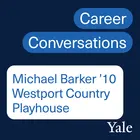
‘Career Conversations’ Podcast: Michael Barker ’10, Managing Director, Westport Country Playhouse, with Emily Kling ’21
Season 2, Episode 5: Michael Barker ’10, Managing Director, Westport Country Playhouse, with Emily Kling ’21
Subscribe
Subscribe to Career Conversations on Apple Podcasts, Google Play, SoundCloud,Spotify, or your favorite podcast platform.
Michael Barker ’10 is the managing director of the Westport Country Playhouse in Westport, Connecticut. He is interviewed by Emily Kling ’20
About Michael Barker
Michael Barker joined Westport Country Playhouse in 2016 from Mill Valley, California, where he was the managing director of Marin Theatre Company. Previously, Barker was general manager of Laguna Playhouse in Laguna Beach, California, and managing director for the Los Angeles classical theater ensemble The Antaeus Company. Before moving to California, Barker was associate managing director at Yale Repertory Theatre and managing director of Yale Summer Cabaret, and produced the first annual Carlotta Festival of New Plays. He was Seattle Repertory Theatre’s 2008 Managing Director Fellow. Barker holds an MFA in theater management from Yale School of Drama and an MBA from the Yale School of Management. At Yale, he was the recipient of the Daniel and Helene Sheehan Scholarship for theater management and a Kosciusko Scholarship for outstanding students of Polish descent. He served on the Yale School of Management Alumni Advisory Board and is a current Association of Yale Alumni delegate. He is a member of the inaugural class of artEquity diversity, equity and inclusion facilitators. He is a member of the vestry at St. Timothy’s on the Hill Episcopal Church in Fairfield. Prior to graduate school, he was associate director of marketing for Court Theatre in Chicago and also worked with Goodman Theatre, American Theatre Company, Sansculottes Theater Company, and The Playground Theater.
Excerpts
Michael Barker: (33:28)
“I think among the reasons that I’m married to an artist and among the reasons that I choose to work with artists is that I care about artists. I want them to succeed. I do a lot of work with unions. We have four unions that work in tiny Westport Country Playhouse. So we have the actors, the stage directors and choreographers, the designers, and the stage hands. And I go to battle with the unions during the day. But my wife is a union member at night. So I understand the value of this. And actually I was taught by a professor, this is at the drama school—but actually Jim Baron, I think, said something similar— where when you think of when you’re bargaining with unions, they’re your collective bargaining partners. They’re not your adversaries. You’re not on opposite sides of the table. You’re on the same side of the table and you’re all trying to get to yes. And that’s Barry Nalebuff, right? You’re all trying to increase the size of the pie so that you can all feel like you’ve won the negotiation.”
Michael Barker: (11:28)
I was just in the MFA program when I applied to Yale, and I think now people apply for both as the usual track. But when I was doing it, there hadn’t been that many joint degrees from the Drama School... The School of Management—it’s a tool belt that has a depth of analytical attention, at least a surface-level academic approach to management, where it gives you access to deep thought around our craft of management leadership, and being able to take that tool belt and then apply it to the very specific thing of regional theater. What the Drama School gives you is, “This is the way people who are very successful do this work,” and I think what the School of Management gave me, to make the facile dichotomy, is, “and this is why I’m going to question whether this is the right way to do it anyway,” right? “And sometimes just because successful people do it that way doesn't make it the right way to do it.” So it’s been a nice, complementary set of trainings that were very different and very different in focus.
Michael Barker: (17:52)
I think, generally speaking, if you join a board of a nonprofit, you’re aligned with their mission, at least in some way. People join boards for all kinds of reasons. I would say certainly there are people at the Playhouse that, because Westport is relatively small, there’s some social cachet to being on the board. But to a person—we have, what now?, 32 board members—to a person I can tell you what they love about our work, whether it’s the artistic piece, the education piece; in some way, they’re all connected to the mission. So I think the alignment is there.
Listen
About Career Conversations
In this podcast series, SOM students sit down with alumni for a series of candid conversations about career paths, industries, opportunities for MBAs, and discussions on various career topics including work-life balance and creating a meaningful impact in business and society. This series is produced by and recorded at the Yale School of Management.
